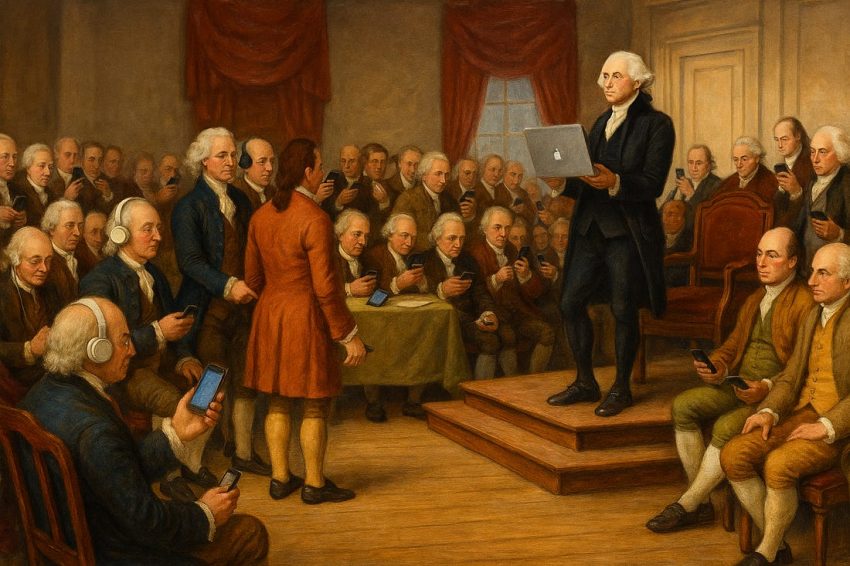 EDITOR’S NOTE: Here’s an installment from Tillamook County’s State Representative Cyrus Javadi’s Substack blog, “A Point of Personal Privilege” Oregon legislator and local dentist. Representing District 32, a focus on practical policies and community well-being. This space offers insights on state issues, reflections on leadership, and stories from the Oregon coast, fostering thoughtful dialogue. Posted on Substack, 5/20/25
EDITOR’S NOTE: Here’s an installment from Tillamook County’s State Representative Cyrus Javadi’s Substack blog, “A Point of Personal Privilege” Oregon legislator and local dentist. Representing District 32, a focus on practical policies and community well-being. This space offers insights on state issues, reflections on leadership, and stories from the Oregon coast, fostering thoughtful dialogue. Posted on Substack, 5/20/25
The case for sticking to the Constitution, even when it’s inconvenient.
By State Representative Cyrus Javadi
Let’s start with something radical: the Constitution is not a vibe.
I know, I know — that’s not what’s trending. These days, America often feels less like a nation of laws and more like a nation of vibes, hashtags, and whichever federal judge can issue the fastest injunction. But here’s the thing: the rule of law is supposed to be boring. Predictable. Procedural. It’s not supposed to trend. It’s supposed to hold.
Last weekend, I was playing golf with an old friend — the kind of guy who skips the small talk and swings straight into politics around the seventh hole. Knowing I’m in the legislature, he had questions. Or maybe just opinions in search of agreement.
We were talking about immigration when he said, “Why can’t we just deport people who are here illegally without all the legal hoops? I mean, I get that the Constitution is nice and all, but due process takes too long.”
It wasn’t malicious. It was exasperated. And honestly, I’ve heard versions of that same sentiment across the political spectrum — not just about immigration, but about guns, speech, elections, and crime. Beneath the frustration is a dangerous idea: if the system’s not giving us the results we want fast enough, maybe the system itself is the problem.
But here’s the thing: the Constitution isn’t a suggestion. It’s not a vibe. It’s the operating manual. And the whole point of having rules is that you use them even when they slow you down — especially when they slow you down.
I get it. Due process can feel like molasses in a microwave. But that’s the deal we made. It’s the guardrail that protects you when your side is out of power. It doesn’t just defend liberty in theory — it limits power in practice. And those limits are what keep us from becoming a country where justice is just whatever the crowd wants today.
Law vs. Whimsy: America’s Founding Oddity
America didn’t start out as a country of shared ethnicity or common ancestry. We weren’t birthed from a tribe or a royal bloodline or even a shared religion. We were born out of an argument. Written down, signed with pens and some panache, and then tested in war. Our founding creed isn’t blood and soil; it’s parchment and ink.
What makes that parchment matter is that it was never meant to be decorative. The Constitution isn’t a wall hanging. It’s a structure. A system. A counterweight to the inevitable temptation to abuse power in the name of virtue, vengeance, or “the people.”
Due Process: Justice Without the Mob
Let’s talk about due process — the idea that the government doesn’t get to lock you up, take your stuff, or ruin your life without following a set of rules first. Boring? Maybe. But also the cornerstone of every civil liberty you enjoy.
You don’t need due process when your party’s in charge. You need it when it’s not. It’s the rule that stops your political opponents from doing to you what you’re so sure you’d never do to them. (Spoiler: You probably would. History says so.)
Too often now, we hear things like “Well, this person is obviously guilty,” or “We know what they meant,” as if gut feelings should substitute for evidence and procedure. That’s not justice. That’s brunch mob rule. Due process is what stands between civilization and a very well-dressed lynch mob with a podcast.
Due Process ≠ Bureaucratic Limbo
Now, let’s clear something up — because this often gets tangled. Due process is not the same thing as red tape. Bureaucratic delay isn’t a constitutional principle. It’s just bad management.
When we say someone deserves due process, we mean they deserve a fair hearing, a chance to be heard, and a decision made by neutral standards. That doesn’t mean endless paperwork, year-long waits for court dates, or a Kafkaesque cycle of lost forms and phone trees. That’s not law — that’s dysfunction with a badge.
And yes, due process can take too long. Justice delayed is justice denied — we’ve known that since before Lincoln grew a beard. But the solution isn’t to skip the process. It’s to fix the system so that justice can move faster without cutting corners.
If your neighbor is wrongly accused of a crime, you don’t want the government saying, “Sorry, the process is slow — so we’re just going to skip it.” You want the process to work, and to work quickly. But you still want it to exist.
Too often, we let bureaucratic sludge sour us on constitutional rights. But that’s like blaming the recipe when the cook burns the food. The right to a fair process is still right — even when the system drags its feet. What we need isn’t less due process. We need less dysfunction gumming up the works.
Separation of Powers: Because People Are the Problem
James Madison didn’t design government for angels. He designed it for us: insecure, impatient, tribal little beings that we are. Which is why he said the powers of government had to be divided — not because division is ideal, but because concentration is dangerous.
Congress makes laws. The President enforces them. Courts interpret them. When those lines get blurry, bad things happen — to liberty, to accountability, and often to the economy.
Which brings us to the executive order.
Executive Orders: When Presidents Get Bored Waiting
Let’s be honest: executive orders are often just what happens when a president runs out of patience and Congress runs out of spine. Immigration reform? Just sign it. Student loan forgiveness? Wave the wand. Climate policy? Pen and phone, baby.
Now, to be fair, executive orders aren’t inherently unconstitutional. But when presidents use them to do things Congress explicitly refused to do — or never even debated — that’s not just pushing the envelope. That’s setting it on fire.
And the public often cheers. Because we’ve started to believe that if the process gets in the way of our goals, then it must be the process that’s broken. But that’s the Constitution doing exactly what it was built to do: slow us down, force debate, require compromise.
Speed is for Amazon Prime. Not for government by the people.
The Right to Bear Arms: A Right With Teeth
Here’s where I lose some people — and gain others.
The Second Amendment isn’t about hunting. It’s not about sport shooting. It’s not even really about self-defense in the narrow sense. It’s about the idea that the citizen has a right — not permission, not privilege, but a right — to possess the means of resistance.
Now, does that mean tanks in every driveway? No. (Though if you’ve seen HOA rules lately, that might not even make the top five concerns.) But it does mean that the state doesn’t get a monopoly on force without a very good reason — and a clear legal process.
And once again, it’s the process that matters. You want new gun laws? Fine. Pass them through the legislature. Make your case. Win the debate. Don’t just sneak around the Constitution like it’s a traffic cone on the way to your preferred policy outcome.
Civil Rights and Slavery: The Constitution’s Deepest Contradiction
Now, before anyone gets too misty-eyed about the Founders and their sacred scrolls, let’s not pretend they got it all right. The original Constitution treated slavery like an awkward roommate everyone pretended wasn’t home.
It took a war, hundreds of thousands of lives, and three new amendments to begin to fix that original sin. And even then, the law didn’t live up to its own promises for another hundred years. Jim Crow. Poll taxes. Literacy tests. Separate but equal. These weren’t just moral failures. They were constitutional betrayals.
But here’s the thing — the movement for civil rights didn’t reject the Constitution. It appealed to it. Dr. King didn’t burn the document; he called it a promissory note. A check marked “insufficient funds.” His fight was to make the law mean what it claimed.
That’s the genius and the humility of constitutional government. It allows for correction without combustion. It lets us say: This was wrong — and here’s how we fix it — without burning the whole house down.
The Law Is Slow. That’s the Point.
We live in a world that worships speed. But the law is supposed to be slow. That’s not a bug. That’s a feature. The Constitution was built to frustrate change — especially when that change is driven by fear, faction, or the passion of the hour.
We all love the rule of law when it works for us. But that’s not the test. The test is whether we uphold it when it costs us — when our side loses, when our policies stall, when our emotions rage.
A republic, if you can keep it. That was Franklin’s warning, and I’d argue it still holds up better than anything on Twitter.
So What Do We Do?
First, stop cheering for end-runs around the Constitution just because the results look tasty. Every shortcut becomes precedent. Every precedent becomes normal. And once the shoe’s on the other foot, don’t act surprised when it kicks you.
Second, teach this stuff. Seriously. If high schoolers can name more Kardashians than amendments, we’re doing something wrong.
Third, rediscover the virtue of procedure. It’s not sexy. It doesn’t tweet well. But it’s what separates us from banana republics, angry mobs, and Reddit threads gone rogue.
In the End, It’s a Choice
The Constitution isn’t magic. It only works if we want it to. It’s just paper without people willing to live by it — and lose by it, if necessary. That’s what makes it different from a king’s decree or a bureaucrat’s memo.
We are not a nation of tribes. We are not a nation of vibes. We are a nation of laws — or we are nothing special at all.
So maybe let’s stop treating the Constitution like a museum relic and start treating it like what it is: the only thing standing between us and chaos.
And frankly, chaos has enough fans already.


